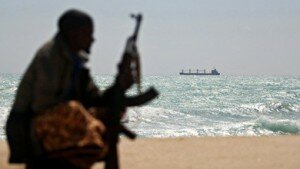The Profits Of Piracy

Bartamaha (Nairobi):-Valero Energy wasn’t too worried earlier this month when a gang of Somali pirates hijacked the supertanker Samho Dream, which was carrying 2 million barrels of crude oil from Iraq to Valero’s refineries on the U.S. Gulf Coast. The cargo was insured and Valero has plenty of time to find backup crude.
More concerned was Samho Shipping, the South Korean company that owns the tanker. Though the Korean Navy sent a destroyer to intercept the tanker before the pirates could get it to port, there was nothing to be done. Start a gunfight and the whole tanker could go up in a fireball.
Instead, freeing the ship and its crew will likely cost Samho’s insurers a ransom of $3 million, about how much it took to spring the Saudi Arabian-owned tanker Sirius Star a year ago. Total ransom payments made to Somali brigands in the past year are thought to be on the order of $150 million.
The total cost of piracy worldwide is somewhere north of $1 billion a year. That sounds like a lot, but it’s no threat to the $7 trillion a year international maritime trade.
It is, however, enough to get the attention of insurers. Before the piracy boom, marine insurers like Lloyd’s had no reason to levy premiums to cover war risk (under which piracy falls), kidnapping and ransom. Today, shipowners are forking over some $400 million a year to cover themselves against a roughly 1% chance that their vessel will be attacked (200 attacks out of 20,000 annual voyages through the region). That comes to an average $20,000 in extra insurance costs per voyage.
For big tankers, the cost is closer to $100,000 per voyage: $75,000 for war risk insurance and $20,000 for a $5 million kidnapping and ransom policy. Though some insurance syndicates have suffered losses paying out ransom claims, overall, piracy has been a moneymaker for the insurers.
At least one shipping line is passing on the higher insurance costs to customers. Maersk Line says it has added a cargo surcharge of $20 for each 20-foot container and $40 for each 40-foot container that is transiting the pirate region.
“The issue is not the money,” says Neil MacNaughton, managing director for maritime coverage at insurance broker Willis Group. “It’s the aggravation that the ship and the crew have to go through. That’s the fear factor.”
Some crews will quit a ship rather than sail into pirate-infested waters. A crew member who endured months of captivity after the hijacking of the Maersk Alabama has sued the shipping line for $75,000 for not having put sufficient security procedures in place.
With that in mind, Willis has devised an insurance product called Vessel Shield. It builds on the standard kidnapping and ransom policy by bringing in consultants to train crews in security, prepare emergency safe rooms where crews can lock themselves in until a hijacked ship can be retaken, and provide round-the-clock advice to captains on safe routes to take. Shipowners that buy Vessel Shield (roughly $35,000 per voyage) instead of the basic kidnapping and ransom policy can get a 50% discount on their war risk insurance. Willis says that out of several hundred voyages covered by Vessel Shield, none have been hijacked.
Want to be even safer? There’s plenty of security consultants, like former Blackwater guys fresh from Iraq, to stand guard on ships (estimated cost: $20,000 a day for a three-man team), grease railings and string razor wire around lower decks. Ships can install acoustic defensive weapons (think sound lasers) at $25,000 a piece–four are needed to cover all the angles.
On top of that, the world’s navies are spending some $300 million a year to patrol the region and escort convoys. A U.S. Navy frigate costs in the neighborhood of $1.3 million a month to operate.
Why not send the military ashore to rout the pirates and the Somali warlords who finance them and take a 30% cut of the ransoms? Bad idea, writes Peter Chalk, an analyst with the Rand Group. He thinks direct military action on land “should be avoided at all costs.” An onshore attack, especially if it results in civilian deaths, would lead to “the dangerous politicization (and radicalization) of what has hitherto remained a purely economic phenomenon.”
Currently the warlords seem to consider killing hostages bad for business. Best not to encourage them to blow up oil tankers rather than hijack them.
———-
Source:-FORBES
Comments
comments
 Calendar
Calendar




































